FCV Test for Cats – Feline CALICIVIRUS Rapid At-Home Test Kit
Price range: $21.96 through $74.96
Free shipping on ALL orders from US!
- Satisfaction Guaranteed
- Easy Refunds
- Secure Payments
FREE SHIPPING with USPS on ALL U.S. Orders
30-Day Risk-Free Returns & Exchanges
The Feline Calicivirus test requires cat’s ocular, nasal or anus secretions, or saliva sample.
It can also be performed using a serum or plasma sample.
For testing, you will need one of the following:
- One swab of secretions or saliva
- 3–10 drops of serum or plasma (a larger sample of serum/plasma makes testing easier)
Each kit contains:
- Test cassette
- Disposable dropper
- Buffer liquid tube
- Cotton swab stick
- Instruction leaflet
If using a secretions or saliva sample, no additional equipment is needed—everything required is included in the test kit.
If using a serum or plasma sample, a syringe and centrifuge are required (syringes are NOT included in the kit).
- Read the instructions carefully before starting the test.
- Secretions sample: collect cat’s ocular, nasal, anal gland secretions, or saliva with the cotton swab. Make the swab sufficiently wet.
Serum or plasma sample: collect a blood sample from the cat (syringes are NOT included). Centrifuge whole blood to obtain plasma or place it in a tube with anticoagulants to obtain serum.
Once the sample is ready the FCV test takes 10–15 minutes to complete. - Prepare the test: Remove the test cassette from the foil pouch and place it on a flat surface.
- Secretions sample: insert the swab stick into the tube containing the buffer liquid and mix thoroughly to ensure proper sample extraction. Then, transfer 3 drops of the sample mixture into the S (sample) window of the test cassette.
Serum or plasma sample: Using the enclosed dropper add 1 drop of the prepared specimen into buffer liquid tube and mix well. Then immediately place 3 drops (approx. 120 μL) of the diluted sample into the S (sample) window of the test cassette. - Wait 5–10 minutes and read the results.
The test is valid for 12 months or longer from the date of purchase.
| Test Type | Relative Sensitivity | Relative Specificity | Relative Accuracy |
|---|---|---|---|
| Feline Calicivirus Antigen Test (FCV Ag): | 97.4% | 97.0% | 97.2% |
Feline Calicivirus (FCV) is a highly contagious virus that causes upper respiratory infections (URIs), or cat flu, in cats, especially kittens.
Calicivirus symptoms may include:
- Runny nose
- Watery eyes
- Sneezing
- Painful mouth sores
- Sudden lameness (in some cases)
Due to its high contagiousness, FCV is a major concern in animal shelters. While there is no direct cure, most cats recover fully with supportive care, though many may become asymptomatic carriers.
FCV is species-specific and does not infect humans.
Description
FCV Test for Cats
At-Home Calicivirus Test Kit – Feline Rapid Test for Calicivirus (Calici, Khaleesi)
A-PET-CARE One Step Rapid Test Kit for Calicivirus Antigen (FCV Ag) – At-Home Calici Test Kit for Cats and Kittens
Choose your pack of 1, 2, 5 or 10 tests.
EXP. DATE: 12 months or later from the date of purchase
Each kit includes:
– Test cassette
– Sterile Disposable Dropper
– Buffer Liquid
– Swab Stick
– Instructions Leaflet
A-PET-CARE One Step rapid test kit for FCV in cats can be performed at home and does NOT require any additional equipment. This is a COMPLETE test.
This cat Calivirus test utilizes cat’s ocular, nasal or anus secretions, saliva sample, or serum / plasma sample and includes a sample collection swab stick.
A-PET-CARE One Step rapid at-home test kit for Feline Calicivirus be used with or without centrifuge.
WHAT IS CALICIVIRUS IN CATS:
Feline Calicivirus (FCV) is virus of family Caliciviridae. It is a highly contagious virus that causes upper respiratory infections (URIs) or cat flu in cats and kittens, causing runny nose and eyes, sneezing, and sometimes painful sores inside the mouth, or sudden lameness. Due to its high contagiousness, Feline Calicivirus is one of the major problems in animal-shelter environments. There is no direct cure for the illness, however, most cats recover completely with supportive care, while many become asymptomatic carriers of FCV.
HOW TO TEST YOUR CAT FOR FELINE CALICIVIRUS AT HOME:
Checking your cat at home for FCV is very simple. Just collect fresh sample of your cat with the included swab stick. Then follow the included instructions. From the moment you obtain the sample, the test takes not more than 10-20 minutes to complete. All the necessary equipment is included. After you perform the test, the results are available at place in 10 min. This is a complete ‘at-home’ test, no need to send it out to the lab. Your VERY EASY TO USE nearby FCV test kit for cats!
HOW DOES A-PET-CARE ONE STEP CALICIVIRUS (FCV) TEST KIT FOR CATS WORK:
A-PET-CARE One Step rapid at-home test kits for Feline Calicivirus (FCV) in cats are based on lateral flow immunochromatographic assay for the qualitative detection of Feline Calicivirus antigen (FCV) in secretions from cat’s ocular, nasal or anus swab, as well as in serum or plasma sample. The test cassette has a testing window with the T (test) zone and C (control) zone. When the cat’s sample is applied into the sample hole of the device, the liquid laterally flows through the surface of the test strip and reacts with the pre-coated monoclonal antibodies. If there is Feline Calicivirus (Calici) antigen in the specimen, a visible T line will appear. The C line should always appear after a sample is applied, indicating a valid result. This means, the device accurately indicates the presence or absence of Feline Calicivirus antigen in the specimen.
Results are ready in 5-10 minutes.
PRODUCT DETAILS
Feline Calicivirus Antigen Rapid Test:
Relative Sensitivity – 97.4%
Relative Specificity – 97.0%
Relative Accuracy – 97.2%
All the components in this kit undergo a triple quality control.
Do not mix components from different lot numbers.
From FPV tests to Giardia tests, we offer wide range of quick home tests for pets.
Best price offer, we won’t be beaten in price.
Feline Calicivirus (FCV) antigen tests for cats and kittens sale with free shipping.
2 reviews for FCV Test for Cats – Feline CALICIVIRUS Rapid At-Home Test Kit
Only logged in customers who have purchased this product may leave a review.

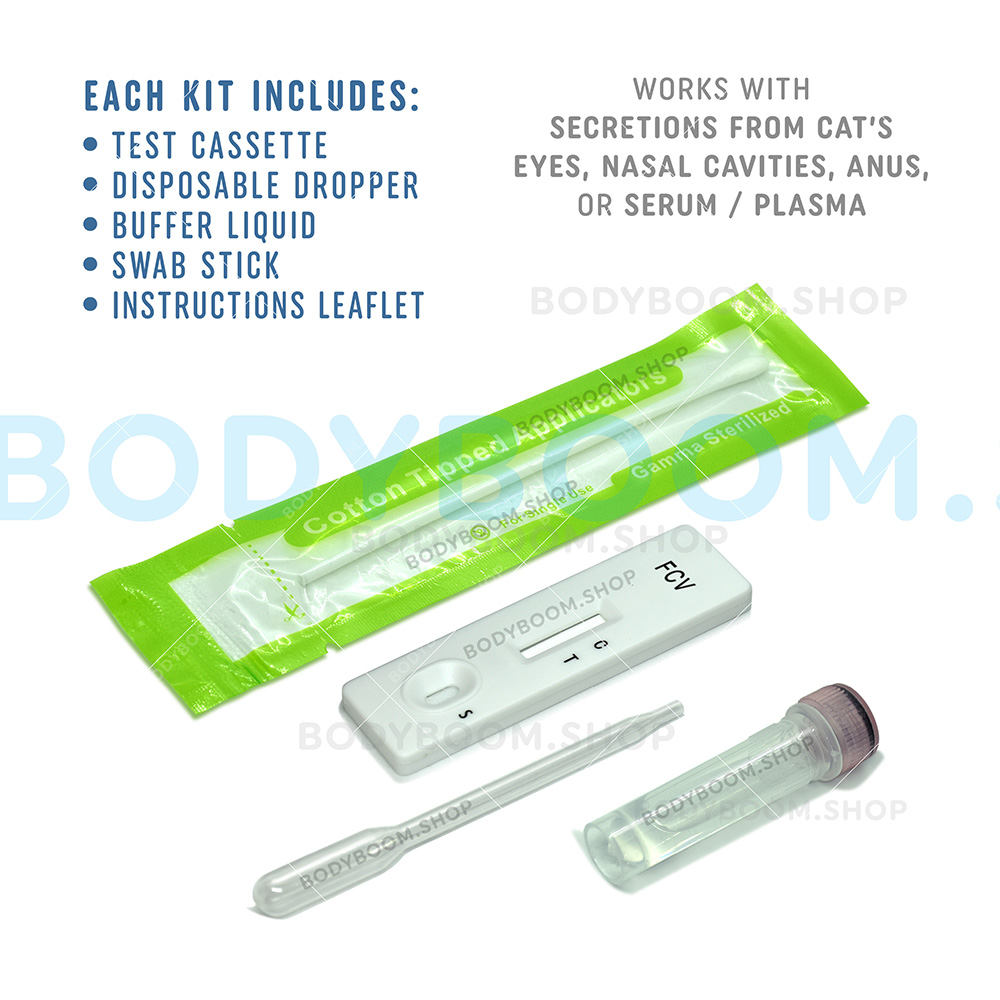
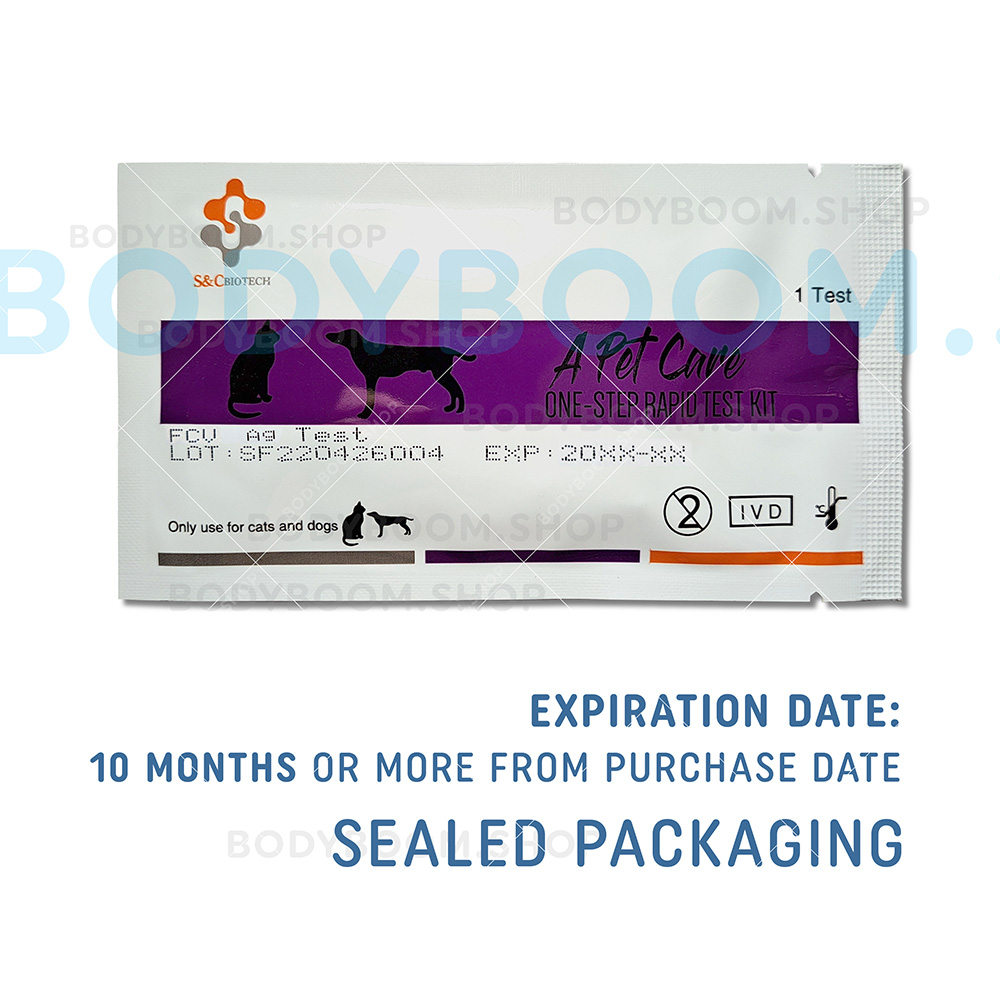
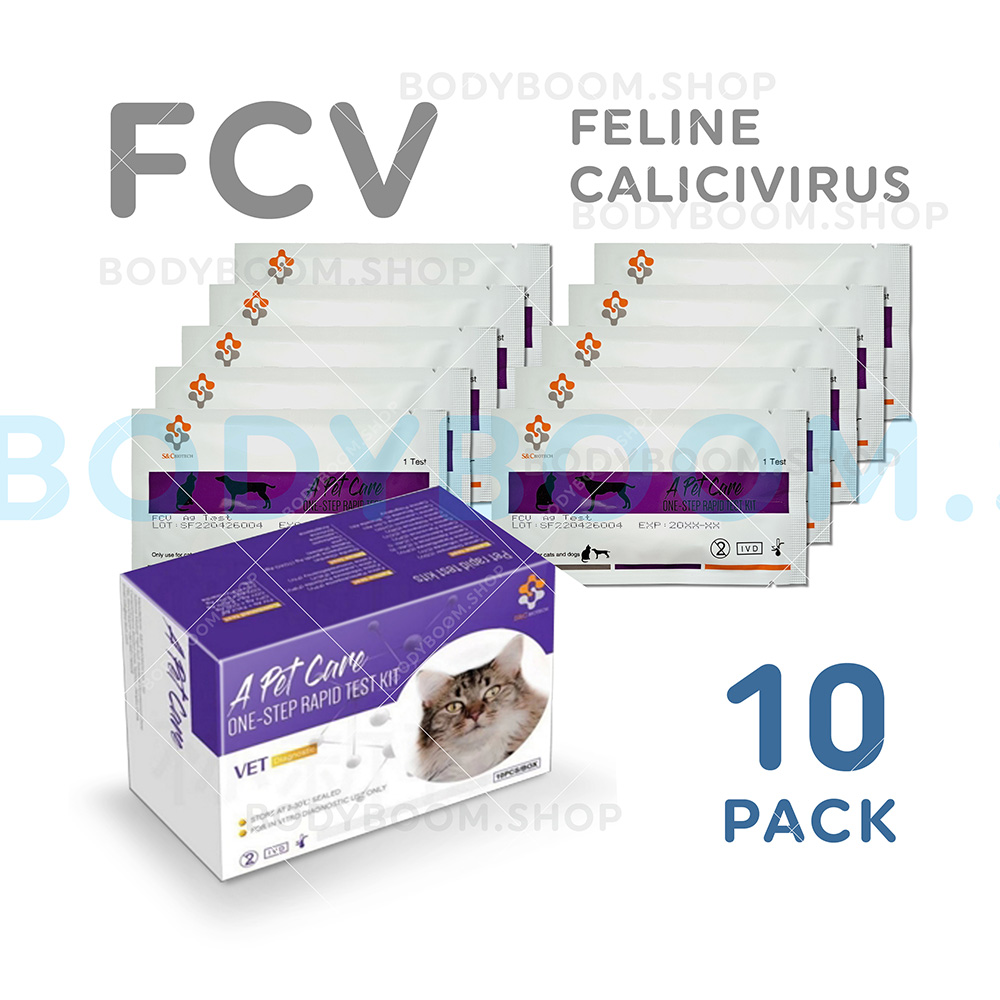



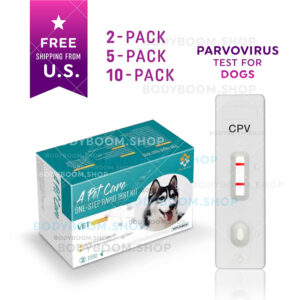
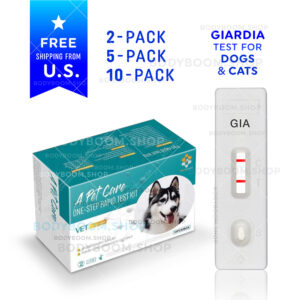
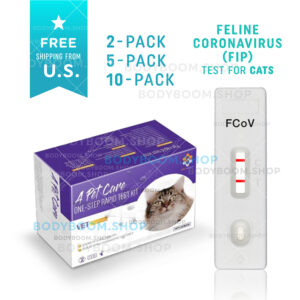
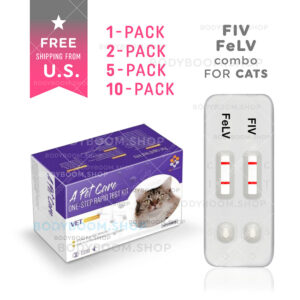
vanessalmonet Verified Buyer –
Good and easy to use.. All included and instant result.. Took not more than 15 min for everything… TNX
Cindy Carson Verified Buyer –
I guess the test worked, it showed negative. But we are still going to the vet.